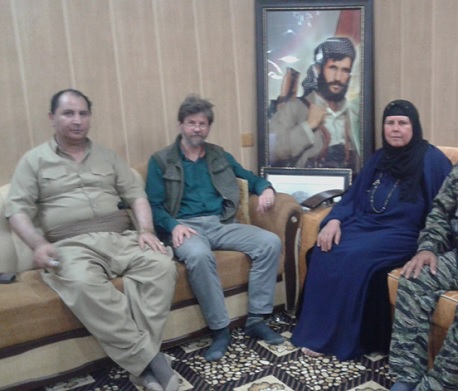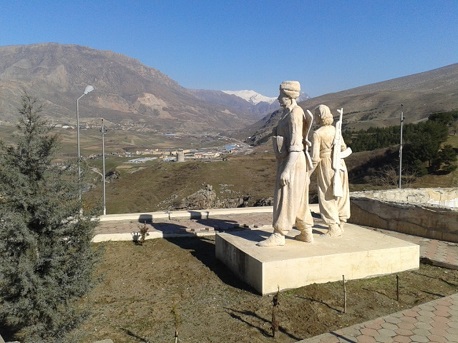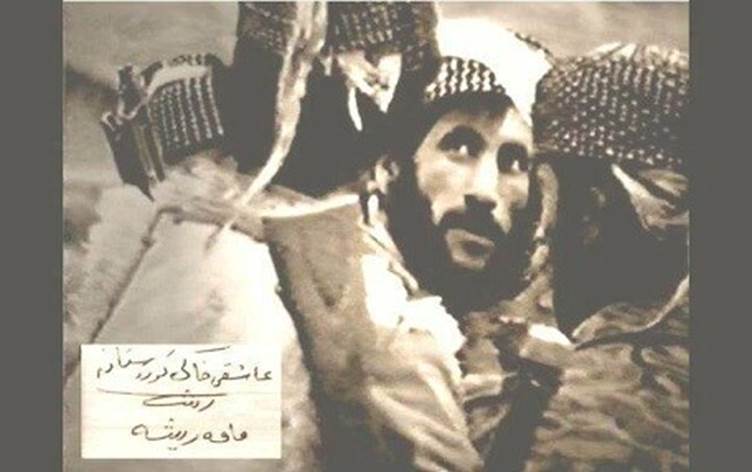CHAMCHAMAL, Kurdistan Region — Statues to fallen martyrs are ubiquitous in Kurdistan. At the summit of the zig-zag road leading from Soran to Ruwanduz, on a prominent embankment overlooking the valley below, are two statues of unnamed male and female Peshmerga. They stand defiantly, dressed in traditional clothing, with a rifle strung over their shoulder, looking out towards the surrounding mountains.
Such statues are potent symbols of Kurdish identity, culture, and the nation’s irrepressible fighting spirit.
All martyrs, those who have died in battle, or those who have lost their lives through execution or assassination, are precious in the eyes of the Kurdish people. There are no favourites, all are loved and remembered by their families, and the communities in which they lived.
But some, due to extraordinary feats of courage, are remembered with special honour. One such figure is that of Najmadin Shukr Rauf, better known as ‘Mama Risha’, the ‘bearded Uncle’, who lost his life fighting against the armies of Saddam Hussein.
According to some Kurdish sources Najmadin Rauf chose the moniker ‘Mama Risha’ because he swore that he would never shave his beard until Kurdistan was totally free from the Ba'ath Party's control.
Everyone, young and old, in Kurdistan has heard of Mama Risha. He is a legend in his own right, the Kurdish Che Guevara, regarded as a freedom fighter helping his people against tyranny. A mention of his name in a lecture I gave to second year undergraduates at Soran University, gave rise to unsolicited cheers and applause.
“I would call him ‘Mama Risha Freedom,’ ” stated one student. “ He was totally fighting for freedom, our freedom,” the student said. “He is an inspiration to us all, especially as we fight Daesh (ISIS) today.”
Although some of what is said about Mama Risha is clearly folklore and legend, other facts are clear.
Mama Risha was born in poverty in 1957 in the village of Talaban near Kirkuk. Following a raid by Iraqi soldiers on his village, Mama Risha, still a teenager, angered by what he had seen in that raid, joined the Peshmerga forces of the PUK, quickly gaining a reputation as a fearless fighter. Due to his courage in combat, he was called the ‘Iron Man’ and ‘Kirkuk’s Lion,’ by his fellow Peshmerga.
Later, as a commander of the Garmiyan battalion in the Kirkuk, Laylan, and Hamrin areas, he showed considerable military prowess in the way he organised ambushes and raids on Iraqi military columns. ‘He knew no fear’, stated his brother Mohammad Shorof. It is said that Mama Risha declared to his enemies: “I will not avoid your attacks, for I am an iron man, my bone is iron, my skin is rock, and my blood is the sea.”

Mama Risha’s brother Shorof (left), Simon Ross Valentine (centre) and Mama Risha’s widow Nishtiman (right) at their home, Chamchamal in the Kurdistan Region. Photo: author
I recently met with Mama Risha’s widow, Nishtiman, his brother Muhammad Shorof and other members of the family at their home in Chamchamal. We sat in their living room eating melon, and drinking chai, as we talked about the Kurdish-Iraqi War. A large photograph of Mama Risha hung on the wall, in the corner of the room.
With one of her relatives acting as translator, Nishtiman, a quiet, unassuming woman in her mid-50s, told me that she married Mama Risha in 1983, but only had two precious years together as man and wife.
In the two hour conversation that followed, Nishtiman informed me Mama Risha “had loved swimming, games of all types and physical exercise.”
I asked about his other interests. Smiling, she replied: “He was totally focussed on defeating Saddam, of defending his brothers and sisters, and how he could gain independence and freedom for his country.”
His brother Shorof, younger than Mama Risha by fourteen years, told me of the remarkable courage shown by Mama Risha and his Peshmerga comrades at the village of Haramik.
Shorof stated how Iraqi intelligence, discovered that Mama Risha was in Haramik: “Quickly they sent a large army to capture him and his twelve Peshmerga colleagues. For 24 hours the Iraqis attacked the village, killing four of the Peshmerga and wounding four others. But Mama Risha was fearless.”
Shorof described how Mama Risha “killed an Iraqi sniper and taking the sniper’s rifle began killing many Iraqi soldiers.”
“Using his skill as a marksman he shot down one of the Iraqi helicopters,” he recalled. “The Iraqis believed that there were large numbers of Peshmerga in the village because of the damage inflicted on them by my brother, and the heavy losses they incurred. Eventually he and his men managed to escape, taking with them the bodies of their fallen colleagues.”
Talking with Peshmerga soldiers in Soran, Erbil, Duhok, and elsewhere in Kurdistan, I heard many other stories of Mama Risha’s courage.
One soldier at Checkpoint Democratic on the frontline at Bashiqa informed me how Mama Risha destroyed a tank single-handedly armed only with a rifle and a grenade, while others told similar tales of fearless bravado, acts of heroism, in which he intimidated and harassed frightened Iraqi soldiers.
Even allowing for hyperbole and the hagiographical colouring that understandably clings on reputations like that of Mama Risha, his life and activities, affirmed by numerous eye-witness accounts, stands as a testimony to the courage shown by Peshmerga against the tyranny of Saddam Hussein.

A monument stands in Ruwanduz to commemorate the sacrifices of the Peshmerga is one of many in Kurdistan. Photo: author
Mama Risha’s death was tragic to say the least. Shorof explained how, at the end of January 1985, Mama Risha, on returning from a skirmish against Iraqi soldiers near Laylan: “A hired-jash (a Kurd collaborating with the Iraqis), Tasin Sha Wayse, invited my brother into his house."
Unsuspecting, and believing the feigned friendship offered by his fellow countryman to be sincere, Mama Risha entered the house and was mercilessly shot — some say in the back — with a machine gun.
It was commonly reported at the time that Tasin received a large amount of money from the Iraqis for killing the Peshmerga hero. Many Kurds have told me that Tasin was later killed by Peshmerga for carrying out this heinous act.
There is a picture statue of Mama Risha in his home city of Kirkuk, where he is remembered. As one Kurd stated on social media, “His heroism will go on in our hearts and our memories forever.”
I asked Nishtiman, his widow, what message she would have for Peshmerga fighting for independence today.
With justified pride she replied, “Our freedom as Kurds is everything. This is what my husband lived and died for. Brave Peshmerga today must continue to fight in the same spirit, and if we follow his example, independence will soon be ours.”




Comments
Rudaw moderates all comments submitted on our website. We welcome comments which are relevant to the article and encourage further discussion about the issues that matter to you. We also welcome constructive criticism about Rudaw.
To be approved for publication, however, your comments must meet our community guidelines.
We will not tolerate the following: profanity, threats, personal attacks, vulgarity, abuse (such as sexism, racism, homophobia or xenophobia), or commercial or personal promotion.
Comments that do not meet our guidelines will be rejected. Comments are not edited – they are either approved or rejected.
Post a comment